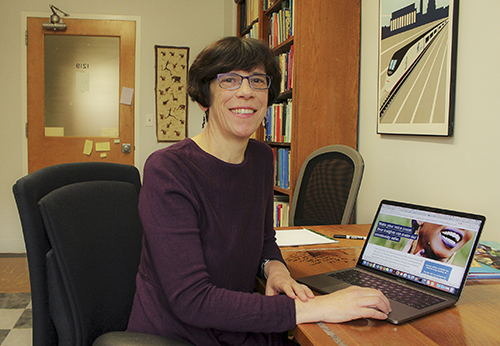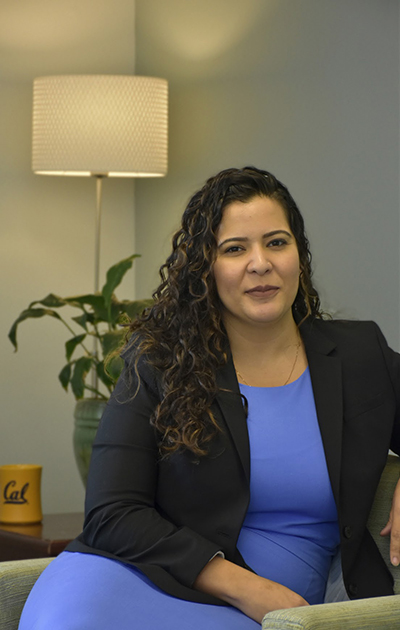Make your voice count: New campuswide survey launches on sexual violence, harassment
Data from students, staff and faculty will inform action plan to strengthen prevention, response

January 16, 2018
In an effort that’s rare on college and university campuses, UC Berkeley today began inviting its entire campus community – about 56,000 people, including students, postdoctoral researchers, staff and faculty – to complete a comprehensive survey on their experiences with sexual violence and harassment, stalking and dating and domestic violence.
The survey, called My Voice, is being conducted by NORC, a nonprofit, nonpartisan social science research organization at the University of Chicago. It is available in several languages and, for those who can’t complete it online, in print form.

Sharon Inkelas is special faculty adviser to the chancellor on sexual violence and harassment. (UC Berkeley photo by Jeremy Snowden)
“Similar surveys at major universities have been for students only and mainly tracked prevalence of incidents,” says Sharon Inkelas, special faculty adviser to the chancellor on sexual violence/sexual harassment. “What’s novel about ours is that we’re asking everyone on campus to take part, and that we’re focusing on our Berkeley community’s knowledge and experience.”
Specifically, the privately funded survey will collect data on the beliefs and attitudes surrounding violence and harassment; the prevalence, both on and off campus, of different forms of violence and harassment; survey participants’ experience with Berkeley’s resources for prevention, response and support; and social norms and current perceptions and misperceptions about violence, harassment and their prevention.
“We will use the survey data to inform an action plan to strengthen Berkeley’s current and future prevention and response efforts,” says Mari Knuth-Bouracee, director of Berkeley’s PATH to Care Center. “While some data will suggest incidence occurrence rates, the focus of the survey is to tailor programs, services and policies to the campus culture’s unique characteristics and challenges in order to improve effectiveness.”
Results of the survey are expected to be publicly available by May.

Student Jillian Free, an ASUC student advocate, is part of the survey team. (Photo by Karen Ni)
“I’m proud that this survey will reach faculty and staff, because sexual violence and sexual harassment is a community issue that affects all of us,” says student Jillian Free, a political economy major and ASUC student advocate who is part of the survey team. “It shows a commitment to community-based prevention and to an understanding of these issues that’s as comprehensive as possible.”
“We’re all in this together,” adds Inkelas, a linguistics professor. “We need to know what the whole community is aware of, so that we can help everyone. The real solution lies in our common commitment not only to disciplining perpetrators, but to changing social norms and creating a culture where these behaviors aren’t accepted, and where we can stop them early on.”
Each member of the campus community is being invited to take the survey via a campus email message and will receive email from NORC containing a personal identification number (PIN). Staff will hear today (Jan. 16) from NORC, and students and faculty will get their PINs on Jan. 22. All those who complete the survey will be become eligible for a drawing for gift cards.
The Chancellor’s Senate/Administration Committee on Sexual Violence and Sexual Harassment was formed in April 2016 to review and help improve the way the campus handles sexual violence and harassment. Among the recommendations developed by the committee was a sexual violence and harassment survey that would provide a baseline to measure the effectiveness of campus interventions.

Mari Knuth-Bouracee is director of Berkeley’s PATH to Care Center. (Photo by Keith Stevenson)
Surveys such as these are considered exceptionally valuable for prevention and response, says Knuth-Bouracee, as they are centered on the most important resource for and solution to the violence epidemic: the people in the community.
No responses will be linked to individual survey participants. All data provided by individuals will be de-identified and kept strictly confidential with the NORC survey team. Berkeley will not have access to any personal information provided by survey participants; it will only receive results only in an aggregated or de-identified format.
The survey, which will be open through February, will take most people about 20 to 45 minutes to complete, and it can be stopped and started as needed. Inkelas says honest answers are vital, and that prompts will be given for how to exit the survey and find resources should any part of the survey cause discomfort or distress.
NORC and Berkeley want to hear from “even those who feel safe on campus,” says Inkelas. “There are a wide range of experiences, norms and attitudes on campus. That is how we can provide the best data and analyses possible. No matter what your experiences have been so far, your voice is part of the solution to violence and harassment.”
Free says the recent wave of sexual harassment allegations being voiced nationwide “absolutely boosts our own campus efforts to examine and understand the harms our community has and continues to face, and shows the need and relevance for this survey even more. This isn’t a Hollywood or outside issue. Now, we’ll have data to prove how critical it is that we take meaningful strides to make our campus better.”